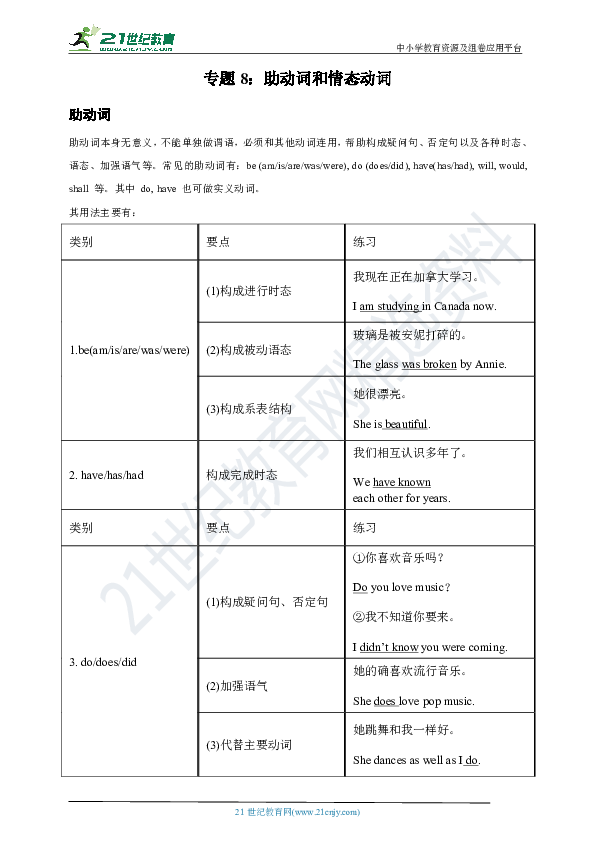
中小学教育资源及组卷应用平台 专题8:助动词和情态动词 助动词 助动词本身无意义,不能单独做谓语,必须和其他动词连用,帮助构成疑问句、否定句以及各种时态、语态、加强语气等。常见的助动词有:be (am/is/are/was/were), do (does/did), have(has/had), will, would, shall 等。其中 do, have 也可做实义动词。 其用法主要有: 类别 要点 练习 1.be(am/is/are/was/were) (1)构成进行时态 我现在正在加拿大学习。I?am studying?in?Canada?now. (2)构成被动语态 玻璃是被安妮打碎的。The?glass?was broken?by?Annie. (3)构成系表结构 她很漂亮。She?is?beautiful. 2.?have/has/had 构成完成时态 我们相互认识多年了。We?have known each?other?for?years. 类别 要点 练习 3.?do/does/did (1)构成疑问句、否定句 ①你喜欢音乐吗?Do you?love?music?②我不知道你要来。I?didn’t know you?were?coming. (2)加强语气 她的确喜欢流行音乐。She does?love?pop?music. (3)代替主要动词 她跳舞和我一样好。She?dances?as?well?as?I?do. 类别 要点 练习 4.?shall/will?(shall用于第一人称,will用于各种人称) 构成一般将来时态 ①我们明天去公园好吗?Shall?we?go?to?the?park?tomorrow?②他们下星期天去野餐。They will go?on?picnic?next?Sunday. 当堂巩固: ( )1. —What is your mother doing, Linda? —She ____ dinner in the kitchen now. A. is cooking B. was cooking C. cook D. cooking ( )2. —Where is Catherine? I haven't seen her for days. —She ____ Wuhan. She'll be back next week. A. has gone to B. has been to C. have gone to D. have been to ( )3. —Your father has gone to Shenzhen on business,hasn't he? —Yes. And he ____ in two weeks. A. will return B. has returned C. returned D. returns ( )4. —The passenger refused to move after taking another one's seat. —What a shame! He ____ according to the newly credit system (诚信体系). A. punish B. punished C. will punish D. will be punished ( )5. —Oh, your room is too dirty, Mike! —Sorry, Mum. It ____ yesterday. I forgot to do it. A. didn't clean B. isn't cleaned C. was cleaned D. wasn't cleaned Keys:AAADD 情态动词 情态动词本身具有一定的意义,本身并不表示动作或状态,不能单独做谓语,必须与后面的动词原形一起构成谓语,表示说话人的语气、态度以及请求、愿望等。它没有人称和数的变化(have to, be able to 除外)。常见的情态动词有:can, could, may,might, must, should, would, need 等。 1.can的用法 用法 例句 表示能力,意为“能,会”,否定式为?can't?(cannot),过去式为?could和?couldn't —Can?you?dance?你会跳舞吗?—Yes,?I?can./No,?I?can't.是的,我会。/不,我不会。 表示请求、许可,意为“可以”,此时与?may?同义 Can/Could?I?borrow?your?umbrella?我能借用你的雨伞吗? 表示客观可能性或推测,意为“可能”,常用于否定句和疑问句中 It?can't?be?Mary.She?has?gone?to?thelibrary.那不可能是玛丽,她已经去了图书馆。 注意:(1)can 与 be able to 的区别 情态动词 用法 例句 can 意为“能,会;可以;可能”,只能用于一般现在时和一般过去时(could),没有人称和数的变化 He?can?finish?the?task?by himself.他可以独自完成这项任务。 be?able?to 意为“能,能够”,可用于各种时态,有人称和数的变化 They?will?be?able?to?tell you?the?result?soon.他们很快就能告诉你结果了。 2.在口语中,常用could代替can,表示比较委婉客气地向对方提出请求或 ... ...
~~ 您好,已阅读到文档的结尾了 ~~

